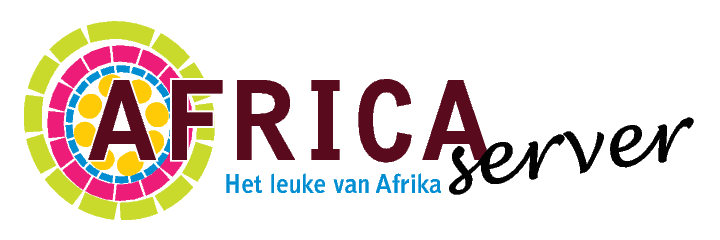Vrijdag 11 Juni 2021
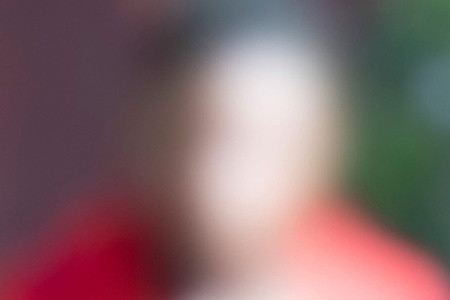
Galleries Curate: RHE Stevenson presents recent portraits by Mame-Diarra Niang & Barthélémy Toguo
Galleries Curate is an informal group of contemporary galleries from around the world, formed as a result of the universally felt global crisis of the COVID-19 pandemic. The coalition focuses on a supportive sense of community and co-operative interactions through collaborative exhibitions designed to express the dynamic dialogue between individual programmes. RHE is the first chapter of this collaboration, an exhibition and website themed around a universal and, we hope, unifying subject: water. Like culture, water is never static but always in flux. Ours is the final exhibition of the project. Looking back, one can distinguish two distinct approaches to the theme of water. On the one hand, there is the political and economic aspect, manifesting in climate refugees, water shortages and privatisation of natural resources. On the other hand, there is the mythical and poetic potential of water: water as image and metaphor. Each of the groups of work in the Amsterdam show illustrates one of these impulses. In his wood carvings, sculpted from the Zingana trees found throughout the country, Toguo pays homage to the sufferings and joys of the residents of the settlement of Bilongue, not far from his Cameroon studio. Léthé, the new series by Mame-Diarra Niang, also consists of head-and-shoulders portraits, but that is where the similarities end. Her previous project, Call Me When You Get There, was a response to the artist’s desire to travel at a time when movements were severely restricted. Scanning the globe from her Paris home using her computer, Niang photographed its screen with her Fujifilm X-T2 camera. In this new series, she uses the same technical set-up but takes a different conceptual approach.
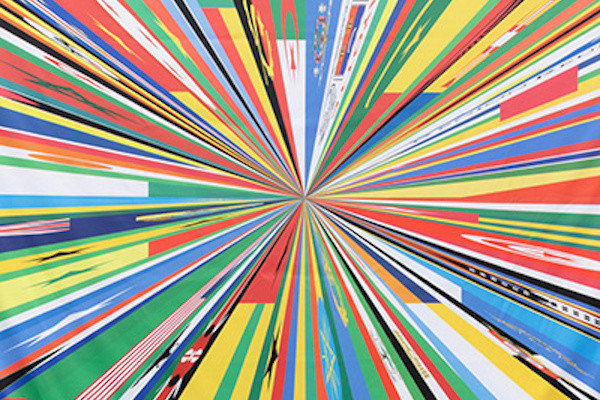
Meschac Gaba - Citoyen du Monde
This exhibition is the second of twin survey shows focusing on the central tenets of the artist’s practice. Bringing together installation, sculpture and two-dimensional works dating between 2008 and 2018, Citoyen du Monde provides an overview of Gaba’s visual theses on nationalism, citizenship and the human toll of statecraft. The works exemplify how Gaba has identified spaces of belonging in both the Global North and South while examining the structures that construct this division. Raised in Cotonou, studying at the Rijksakademie, living in Rotterdam and retiring in Cotonou, Gaba has attributed his nomadism and experiences of migration as key to his own understanding of his Africanness. Translating as ‘Citizen of the world’, the phrase used as the title of this exhibition was first seen in Gaba’s oeuvre as the title of his 2012 ‘banner’, expressing an ideal of unity through the construction of a global flag. This radiant amalgam of the world’s national symbols, taken further in the direct allegory of his large-scale Globalloon (2013), echoes the artist’s vision for solidarity. Like the Globalloon, African Unity (2018) is underpinned by a principle that centres idealism in an attempt to ‘infuse a playfulness into our perceptions of the world – in turn, making the world a better place for us all’. As Phyllis Clark Taoua and Taylor Kathryn Miller have observed, ‘Gaba plays with the imagery of nationhood and his irreverent treatment of where political communities begin and end unsettles the once sacred narrative of national liberation.’ The economic and geopolitical intersections that inform how nationhood is constructed in an increasingly globalised marketplace are articulated in Project Voyage (2012), the Diplomatique series (2008-13) and Zimbabwe Survival (2016). The latter works feature devalued and decommissioned banknotes as part of their structure, examining the nation as commodified and commodifying force.
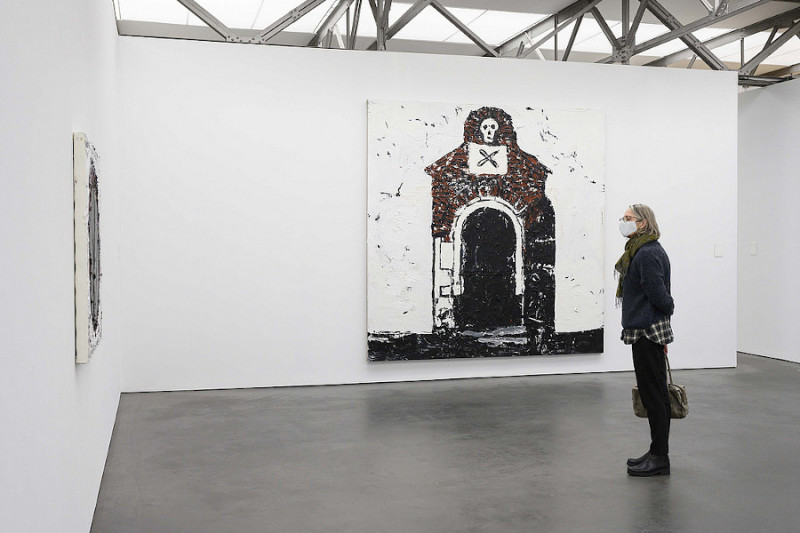
Hans Broek - The Things I Used To Do
Met uitgestrekte panorama’s van de Amerikaanse Westkust blies Hans Broek (Veenendaal, 1965) 25 jaar geleden het landschapsschilderij nieuw leven in. Daarvan zijn in de collectie van De Pont diverse voorbeelden te vinden. In de tentoonstelling The Things I Used To Do speelt het landschap opnieuw een belangrijke rol. Maar in plaats van de witgepleisterde stadsvilla’s van Los Angeles zien we nu forten, kerkers, celdeuren en huizen van plantagebezitters langs de kusten aan beide zijden van de Atlantische Oceaan. Ze figureren als stille getuigen van het Nederlandse slavernijverleden. Broek raakte door dat verleden geïntrigeerd in de tijd dat hij in Amerika woonde en de kloof tussen de witte en de Afro-Amerikaanse bevolking dagelijks ervoer. Hij verdiepte zich in de geschiedenis van de slavernij en reisde naar Ghana, Senegal, Suriname en Curaçao. Als nazaat van een zeventiende-eeuws bestuurslid van de admiraliteit – die nauw met de slavenhandel was verbonden – voelde hij zich persoonlijk betrokken bij een van de pijnlijkste momenten uit de Nederlandse geschiedenis. In deze omvangrijke serie schilderijen grijpt Broek terug naar de meer expressionistische stijl van zijn vroege werk. De verf voelt zwaar en drukkend – zelfs het sprankelende licht ontkomt daar niet aan. Dat gevoel wordt versterkt door teksten met data en plaats delict. Zo confronteren de vaak immense doeken ons met een duister verleden, waarbij ze tegelijkertijd als land- en als geheugenkaarten fungeren. Beluister en bekijk ook de podcast van Richard Kofi, in gesprek met Hans Broek.
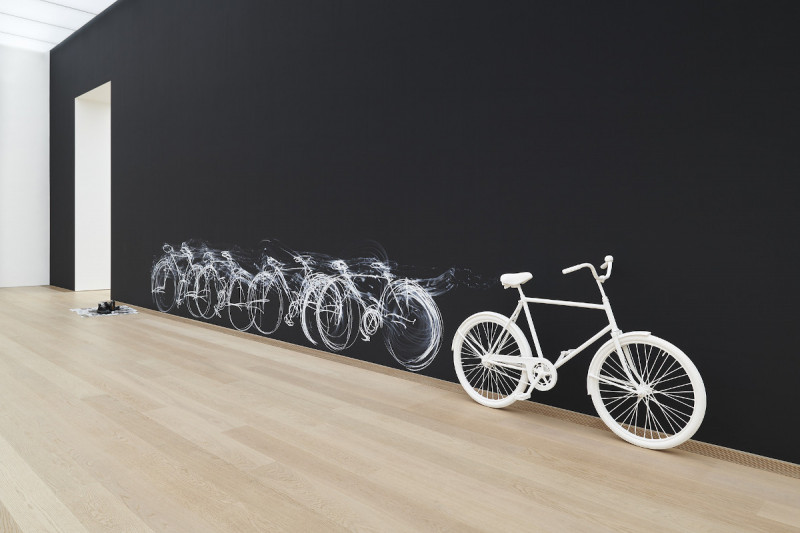
Robin Rhode (Zuid-Afrika)
Voorlinden presenteert de eerste solotentoonstelling van kunstenaar Robin Rhode (Zuid-Afrika, 1976) in Nederland. Met dit overzicht viert Voorlinden zijn artistieke reis van 2000 tot nu toe. Of het nu een foto, film, sculptuur of performance is, al zijn werken beginnen met een tekening. Robin gebruikt de muur als zijn canvas, waarop hij met zijn tijdelijke interventies een imaginaire wereld verbeeldt. In aanloop naar de tentoonstelling neemt Robin je in korte video’s mee in zijn studio, vertelt over zijn favoriete werken, zijn inspiratiebronnen en over zijn voorbereidingen voor de tentoonstelling bij Voorlinden. De muur is een belangrijk motief en podium. Deze vormt voor Robin geen begrenzing, maar een raam naar de verbeelding. Met krijt, houtskool en verf tekent hij op de muur het decor voor zijn performances, die hij vastlegt op foto of film. Robin is een ware illusionist. Hij weet met slechts enkele lijnen een hele wereld tot leven te wekken en prikkelt daarmee ook onze verbeeldingskracht. In de afgelopen twee decennia heeft Robin een veelomvattend oeuvre neergezet met een sterk eigen signatuur. Zijn werk is speels en zit vol met verwijzingen naar de muziek, poëzie, kunst en geschiedenis. Zijn oeuvre wordt gekarakteriseerd door een visuele combinatie van street art, tekeningen, schilderijen, sculpturen, performances, film en fotografie. Zijn favoriete materialen zijn houtskool, krijt en verf en je herkent zijn werk aan de eenvoudige en heldere vormentaal. Door de jaren heen transformeert Robin van eenzame performer naar een regisseur van een gezelschap waarmee hij samen meer ambitieuze producties realiseert. Robins artistieke reis begint in zijn vaderland Zuid-Afrika, om vervolgens met zijn interventies de wereld over te trekken.
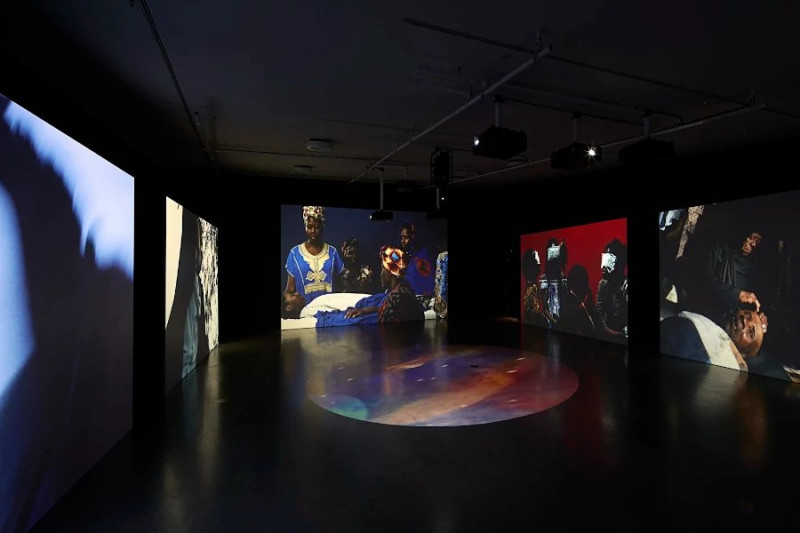
Vive le cinéma! Art & Film - Lucrecia Martel, Leopold Emmen, Lemohang Jeremiah Mosese, Carlos Reygadas and Jia Zhang-ke
Every day various films, talks & events. The filmmakers — Lucrecia Martel (South America), Leopold Emmen (Europe), Lemohang Jeremiah Mosese (Africa), Carlos Reygadas (North America) and Jia Zhang-ke (Asia) — were each invited to make a work for the exhibition that exploits the three-dimensional gallery space rather than the two-dimensional cinema screen. For some of them, it was the first time they had created a cinematographic installation that explores the boundaries of their work and of the art of film in general. To mark the 75th anniversary of the Filmmuseum and the 50th International Film Festival Rotterdam (IFFR), Eye and the IFFR have selected five film directors from five continents as a way of celebrating the unlimited power and diversity of world cinema, which is so vital for the programming. Jia Zhang-ke (Fenyang, China, 1970). Nanouk Leopold & Daan Emmen (both born in Rotterdam in 1968). Lucrecia Martel (born in Salta, Argentina, 1966)/ Carlos Reygadas (born in Mexico City in 1971). Lemohang Jeremiah Mosese (born in Hlotse, Lesotho, in 1980) who rose to prominence as a filmmaker with her debut film The Swamp (2001), and more recently with the hallucinating Zama (2017). Time and space in her work are elastic and infinite, and the sound design often determines the final form of the film. In The Passage, her new installation at Eye, she works with heat images and voices from northern Argentina (qom, quechua, aymara, wichi and guarani), yet another attempt in unmasking the artificiality of race.
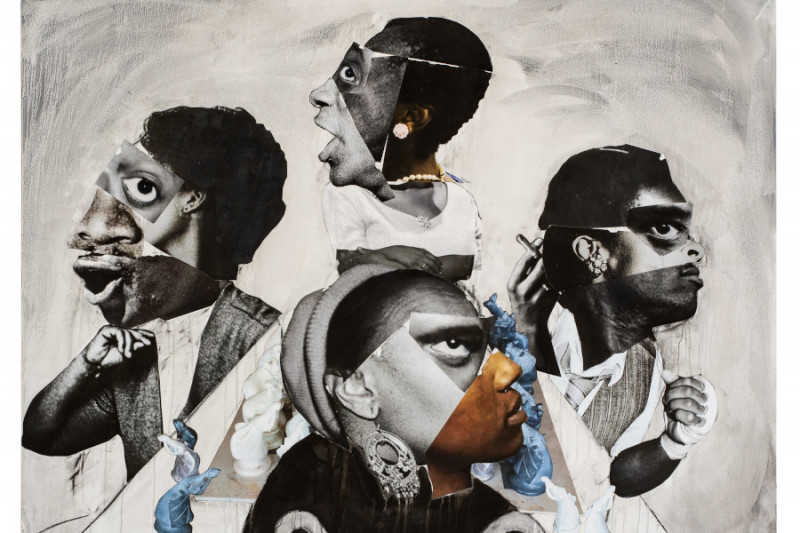
The Friends of S.M.A.K. present Neo Matloga
In the exhibition at the Friends of S.M.A.K in Gent, South African artist Neo Matloga presented a selection of works that haven’t been seen physically in Europe. This presentation marks his first institutional exhibition in Belgium. The show opened May 29th, for those who will be in the vicinity, the show ends August 29th. Coordinated by Nadia Bijl. Neo has been selected as one of 30 artists to participate in Watou 2021, a festival coordinated by a trio of curators Benedicte Goesaert, Chantal Pattyn and Peter Verhelst. 'The 40th edition represents movement, harmony, humanity and intensity.' The festival is in Watou, Belgium and is open until September 5th. Also, thrilled to be showing his large scale intimate collage paintings in my whole body changed into something else, a group exhibition taking place across the Stevenson galleries in Cape Town and Johannesburg, South Africa. The show is curated by Sisipho Ngodwana and Sinazo Chiya. Open from 15th of July till 3rd September.
